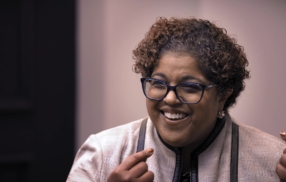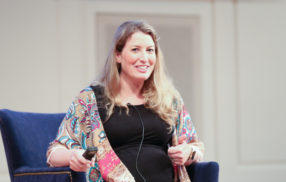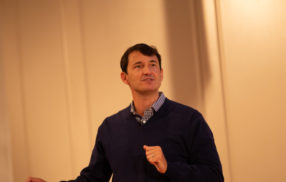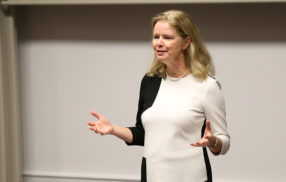Former McDonald’s Sustainability Chief: How the Fast-Food Giant Supersized Its Environmental Leadership
By Dave Hendrick
Bob Langert describes his career at McDonald’s as an “amazing, mind-boggling journey” — one in which he cannot quite believe he had the good fortune to take part.
Joining the company in the late 1980s with the charge to “take the power of McDonald’s and try to do good in the world,” Langert, who led McDonald’s Corporate Social Responsibility and Sustainability division until retirement in 2015, said he came to the role with activism in his heart and a passion for business, twin interests that oriented his actions during his 25-plus years at the company.
Speaking at the University of Virginia Darden School of Business at a Leadership Speaker Series event during the Net Impact student club’s Net Impact Week, Langert highlighted his experience navigating friction points at the intersection of commerce and sustainability and the lessons he drew from key accomplishments.
In the late 1980s, for instance, McDonalds found itself painted as one of the prime culprits in a supposed “waste crisis” sweeping the country. In particular, the company’s ubiquitous foam clamshell sandwich containers were cited as an example of particularly wasteful packaging.
After failed attempts at training customers to recycle polystyrene foam containers, Langert detailed the unexpected partnership that blossomed between McDonald’s and the Environmental Defense Fund (EDF), once a staunch adversary.
“Today, maybe that doesn’t sound like a big deal, back then this was huge news,” Langert said. “We were thinking these people are the enemy, and they became my best friends.”
The partnership eventually led to significant revamp of the company’s packaging items, and a subsequent waste reduction action plan, jointly released by the company and EDF, eventually eliminated more than 150,000 tons of McDonald’s packaging and led to the purchase of more than $3 billion worth of recycled goods, from napkins to booster seats. Moreover, the company executed the plan without spending any additional money.
The success story “worked like an MBA school case study on how to make transformative change in a corporate environment,” Langert writes in his recently published book The Battle to Do Good: Inside McDonald’s Sustainability Journey.
Langert walked students through similar stories of working toward win-win solutions with organizations that might at first blush appear to be adversaries, collaborating with Greenpeace on issues related to rainforest devastation and renowned animal scientist Dr. Temple Grandin on issues related to animal welfare, for instance.
Shortly before he retired, Langert led the company to adopt a 2020 Sustainability Framework, making ambitious issues of sustainability part of the company’s fabric.
The lesson he repeatedly took from such experiences was that “collaborating with experts, bringing them into your business and being open to change” often led to exemplary results.
Langert said he often thought back to a sentiment he once heard from Darden Professor Ed Freeman, who introduced Langert: Issues that may seem like conflicts with elements of society are not problems, but areas of opportunity.
Langert, who also joined Darden students for an informal networking session following his talk, offered eight attributes that he said informed his attempts to be a good leader:
- Contrariness
- Courage
- Cleverness
- Cheerfulness
- Conviction
- Collaboration
- Charisma
- Humility
The University of Virginia Darden School of Business prepares responsible global leaders through unparalleled transformational learning experiences. Darden’s graduate degree programs (MBA, MSBA and Ph.D.) and Executive Education & Lifelong Learning programs offered by the Darden School Foundation set the stage for a lifetime of career advancement and impact. Darden’s top-ranked faculty, renowned for teaching excellence, inspires and shapes modern business leadership worldwide through research, thought leadership and business publishing. Darden has Grounds in Charlottesville, Virginia, and the Washington, D.C., area and a global community that includes 18,000 alumni in 90 countries. Darden was established in 1955 at the University of Virginia, a top public university founded by Thomas Jefferson in 1819 in Charlottesville, Virginia.
Press Contact
Molly Mitchell
Senior Associate Director, Editorial and Media Relations
Darden School of Business
University of Virginia
MitchellM@darden.virginia.edu







